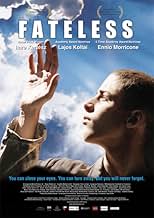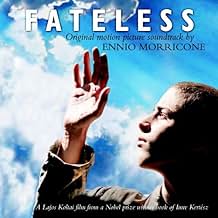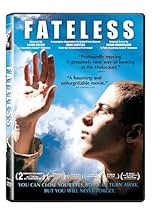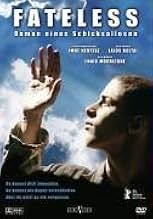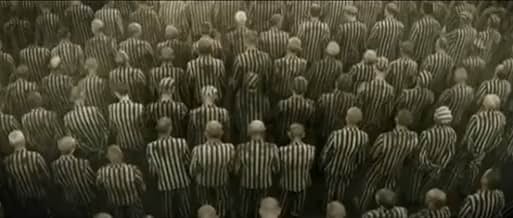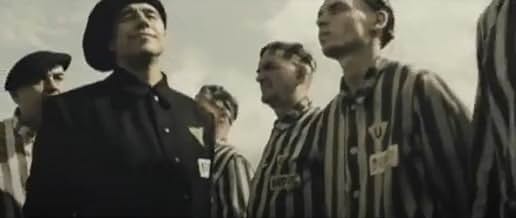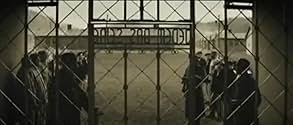Füge eine Handlung in deiner Sprache hinzu14-year-old György's life is torn apart in WWII Hungary, as he is deported first to Auschwitz and then to Buchenwald, where he is forced to become a man in the midst of hatred, and what it r... Alles lesen14-year-old György's life is torn apart in WWII Hungary, as he is deported first to Auschwitz and then to Buchenwald, where he is forced to become a man in the midst of hatred, and what it really means to be Jewish.14-year-old György's life is torn apart in WWII Hungary, as he is deported first to Auschwitz and then to Buchenwald, where he is forced to become a man in the midst of hatred, and what it really means to be Jewish.
- Auszeichnungen
- 6 Gewinne & 7 Nominierungen insgesamt
- Moskovics
- (as Dani Szabó)
Empfohlene Bewertungen
We first meet Gyorgy Koves as a curly headed handsome 14-year old youth in 1944 bidding farewell to his beloved father as he departs for a labor camp. Wearing the yellow star of David proudly, Gyorgy has little understanding of what it is to be a Jew, a lesson he will learn in the coming year and affect his perception of the world and his place in it. Gyorgy's mother left his father and his father has remarried and requests that Gyorgy stay with his stepmother while he is away 'for a while' in the labor camp. Gyorgy is conflicted as he loves his mother but he does as his father requests. Almost inadvertently Gyorgy and his friends are taken off a bus and separated by the Nazis into trains bound for concentration camps. Gyorgy remains relatively naive about what is happening: his head is shaved, his worldly goods are absconded, and he begins the hellish life of survival in Auschwitz. Where Kertesz writes differently than other authors who have described Holocaust conditions is in his mindset of Gyorgy: Gyorgy strives to retain a sense of equilibrium in this bizarre new life, seeing certain events as probable errors, mistakes, or simply 'the way things are'. He endures starvation, brutal work, pain from an injured and infected knee, boredom, and observing sights of torture of his fellow prisoners. Though he is walking in a stunned world, he is still able to fine the little moments of 'happiness' because of his youthful outlook and creative mind. He gradually grows to understand what being a Jew means, and while he is unable to fathom all he sees in captivity, he learns that if he can't understand life in a concentration camp, how can he understand life outside either. Gyorgy is literally on the carts moving toward the crematorium when the Allies free the camp. He meets an American (Daniel Craig) who suggests he not return to Budapest, but go to America instead where he can pursue a new existence. Yet Gyorgy's devotion to family, to country, and to being a Jew returns him to Budapest where he finds a destroyed city that had been home and wanders the town square trying to make sense of it all.
As Gyorgy Koves, Marcell Nagy gives a stunning performance, a picture of a child/man who is forced to enter the world of adulthood via the horrors of Auschwitz. Nagy captures the essence of the character with minimal dialogue and maximum use of his body language and eyes. The supporting cast is superb, each creating vignettes in the few moments we see them that burn into our memory. The cinematography by Gyula Pados uses subdued color for the scenes outside the camps and a subtle sepia toned black and white or the scenes within the walls of the terrifyingly real buildings and yards of the camps. The musical score by Ennio Morricone sustains the mood throughout. But it is the director Lajos Koltai whose impeccable sensitivity to Kertesz' writing and vision that makes this long (140 minutes) film a seamless pondering of the passage of time - minute by minute, hour by hour, day by day, etc - that is the essence of Gyorgy's survival of a nightmare 'with little moments of happiness wherever they may happen'. This is a magnificent film, by a gifted crew, and though it contains visuals that will crush your heart, it must be seen to be believed. In Hungarian and German and English with subtitles. Highly Recommended. Grady Harp
It takes quite a while for the viewer to understand that the point of Nobel-prize winning Imre Kertész's adaptation of his debut, semi-autobiographical novel is to tell the specific story of Hungarian Jews, as zero context is provided for the opening, anecdotal scenes, no dates, no background information on where in World War II we are starting from and not even how much time is passing in the first third of the film as the Nazis' net tightens on Budapest's Jews.
Perhaps director Lajos Koltai's goal in not providing the kind of context that was carefully established on films where he was the cinematographer, "Sunshine" and "Max," was to help us understand the bewilderment of the diverse Jewish community-- observant and secular, capitalists and workers, young and old, and the randomness of what happened to them. Families coalesce in confusion as they are buffeted by scraps of information, changing government directives, amidst anti-Semitism and collaboration by their fellow Hungarians. We're also supposed to believe, however, that amidst these confusions the young teen protagonist (the very expressive Marcell Nagy) has extensive philosophical discussions with his play mates, and the girl next door who he of course has a crush on, about Jewish identity. Otherwise, his WWII experiences look a lot like the boy's in Spielberg's "Empire of the Sun."
The next third of the film is gruesome experiences in concentration camps as we have seen before, even though these are extremely effectively re-enacted as the huge cast of actors and extras desiccate before our eyes. The production design in recreating the bare shelter and their work detail is the most realistic I've seen in a fiction film, as compared to documentaries and as described to me by a cousin who was the sole Holocaust survivor in our family (I'm named for her father who died in Auschwitz).
Halfway through these horrors, the theme of the film as to the uniqueness of the Hungarian experience starts to come through more than the usual Nazi sadism. Survival is linked to mutual dependence, camaraderie and bonding that comes from their national identification, even more than their shared religion (we see a few inmates nobly strive to maintain Jewish rituals). Individual personalities vividly come through and attitude and the help of one's fellow man turns out to be as important as food, as life is reduced to its most basic elements. The only other film I've seen that communicates this as emotionally was Peter Morley's documentary "Kitty: A Return to Auschwitz," about an essential mother/child bond.
Even during the camp experience, though, some subtleties are lost by lack of context for an English-speaking audience, as a few scenes were confusing to me as there was evidently significances if a character was speaking German or Hungarian, and that difference went by me. The German signage was not translated, so the last part of the boy's Buchenwald experiences was also confusing, unless the point was that he was mystified as well. The voice over narration throughout is, unnecessarily, for philosophical ruminations and does not communicate any additional information than the stark visuals and conversations.
With liberation indirectly providing the first date reference in the film as we presume it is 1945, Daniel Craig has a cameo as an American soldier, in his second appearance in a film in the past year as a Jew, after "Munich." His role recalls Montgomery Clift in Fred Zinnemann's 1948 "The Search," as one of the few films to also portray the wandering Jews as Displaced Persons amidst the rubble of Europe and their destroyed lives and communities.
The last section is movingly unique and vital viewing as we see Europeans, who we know from France to Russia but here particularly Hungarians, will settle into their amnesia and denial of responsibility, what a survivor in a documentary called "the 81st blow" that is the worst of all. While issues of vengeance are included in passing, the survivors seem like ghosts in their tattered prison garb as haunting images that affront and challenge returning normality like echoes of a nightmare that should go away in the light of day. The survivors are suffering from post-traumatic stress and cannot communicate what happened to them in language that the curious, whether family, friends or strangers, can understand-- or want to understand. The visceral impact is again marred by duplicative philosophizing.
Ennio Morricone's score emphasizes the potential for humanity, with beautiful vocalizations by Lisa Gerrard.
As to the cinematography, indiewire reports that the film used bleached-bypass color prints, with laser-applied subtitles: "In the concentration camps, it becomes more monochromatic. And after the liberation, the color comes back in." I saw it still in first run at NYC's Film Forum and the print was already scratched quite a bit, and there were frequent white on white subtitles.
A neighbor whose family had experiences as in the film provided background: "The Germans entered Hungary on March 19, 1944. They had exactly one year to do there what they did in Poland, Czechoslovakia, etc. in 6 years. The deportations started around April-May of 1944 from the outskirts of the country, leaving Budapest to the end and since the war was over the following May, there was no time to deport them as well. Jews from Budapest had to be terribly unlucky to be sent to the chambers. That's why my parents, who survived, and grandparents, who did not, were sent to the camps because they did not live in the capital. It was very haphazardly done from the capital. There were several groups of Jews who were taken from labor camps to the front in the Ukraine."
There are weaknesses too, of course, some dialogues, mainly in the beginning of the film are not natural (maybe it comes from Kertész's newness in film-writing), it' very disturbing as some weak acting in a few episodes. Marcell Nagy is not a bad choice for the leading role, he has the look and the power in his eyes but in speech he's not convincing, it drops you out of the atmosphere sometimes but it won't bother the not-Hungarian audience.
'Fateless' is an impressive European masterpiece, Hungary should be proud of it.
Marcel Nagy is spectacular, the director chose an amazing face and voice for the part, the character's attitude towards what's happening is shockingly mature and disaffected. He doesn't break down crying, or screaming , "why?!", he simply accepts that this has happened and tries to deal with it almost entirely inside his head. He is an introvert, speaking softly, and politely to those around him. He doesn't ask too many questions because he already thinks he knows all the answers. And these terrible answers are projected to the audience with the use of his powerful blue eyes, and his vital facial expressions (there are few scenes where the boy looks directly into the camera, and makes eye contact with you, the audience and I almost burst out crying..)
The look of the film was what made the rest so sublime, the grays and blues were so dis-enchantingly beautiful, as horrid in a way it is to call a Holocaust film beautiful, the effect is more of seeing what is inside the mind of an innocent; the dramatization of color desaturating could be considered the gradual removal of that innocence. The best way I could describe this is a 'dreamy nightmare', also so fitting an aesthetic, since a delirium sets in to those suffering, and those watching them suffer - it all becomes so heightened and insane; the men and women here are being stripped of the appreciation of beauty, but kindness among these prisoners remain, and that seems a unique aspect to this story. The fact is that Kertesz's memories include these acts of kindness, and camaraderie, rather than remembering back to it as something so completely horrendous, as as to be denying these victims the right to be human. But they are. In this film, there are no extreme acts of violence or mayhem (some minor, but no guns mowing down innocents like Schindler's List), just a quiet, reflective look at the human condition, and the innocent youth caught in the web of evil's banality.
I think the main problem people had with this film was they were expecting something... a little more dramatic, while this is a very quiet, very slow film that will appeal to those who work on those frequencies.
Wusstest du schon
- WissenswertesThe production unexpectedly ran out of money halfway through and halted for several months in order to find new investors. This ended up working in its favor, since Marcell Nagy was going through puberty, and by the time they restarted, he looked physically more mature, taller, and his voice deeper. By the time his character enters and survives the death camp, he looks several years older than when the film began, adding an element of reality that otherwise would have been created with make-up.
- Zitate
[last lines]
György Köves: [narrating] People only ask about the horrors, whereas I should talk about the happiness of the camps next time, if they ask. If they ask at all. And if I don't forget myself.
- Crazy CreditsFlash v. Schwabenland, Production Dog
- SoundtracksHoldvilágos éjszakán (On a Moonlit Night)
Music by Mihály Eisemann
Lyrics by István Zágon
Sung by the four boys when the group is in transit
Top-Auswahl
- How long is Fateless?Powered by Alexa
Details
- Erscheinungsdatum
- Herkunftsländer
- Offizielle Standorte
- Sprachen
- Auch bekannt als
- Fateless
- Drehorte
- Produktionsfirmen
- Weitere beteiligte Unternehmen bei IMDbPro anzeigen
Box Office
- Budget
- 2.500.000.000 HUF (geschätzt)
- Bruttoertrag in den USA und Kanada
- 196.857 $
- Eröffnungswochenende in den USA und in Kanada
- 12.680 $
- 8. Jan. 2006
- Weltweiter Bruttoertrag
- 2.512.009 $
- Laufzeit
- 2 Std. 20 Min.(140 min)
- Farbe
- Sound-Mix
- Seitenverhältnis
- 2.35 : 1





